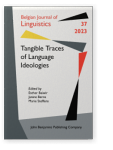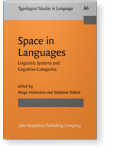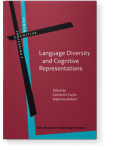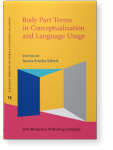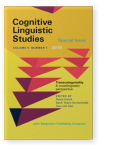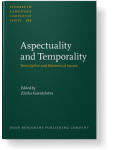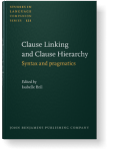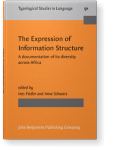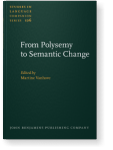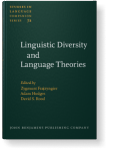Stéphane Robert
List of John Benjamins publications for which Stéphane Robert plays a role.
Yearbook
Titles
Space in Languages: Linguistic Systems and Cognitive Categories
Edited by Maya Hickmann † and Stéphane Robert
[Typological Studies in Language, 66] 2006. x, 361 pp.
Subjects Cognition and language | Semantics | Typology
Language Diversity and Cognitive Representations
Edited by Catherine Fuchs and Stéphane Robert
[Human Cognitive Processing, 3] 1999. x, 229 pp.
Subjects Cognition and language | Cognitive psychology | Semiotics
2020 On the grammatical uses of the ‘head’ in Wolof: From reflexivity to intensifying uses Body Part Terms in Conceptualization and Language Usage, Kraska-Szlenk, Iwona (ed.), pp. 133–168 | Chapter
In Wolof (Atlantic, Niger-Congo), the grammatical uses of the word for head (bopp) with a possessive modifier range from direct and indirect reflexive pronoun to adnominal intensifier through an intermediary genitival reflexive. This study analyzes the semantic continuity between those different… read more
2018 The challenge of polygrammaticalization for linguistic theory: Fractal grammar and transcategorial functioning Transcategoriality: A crosslinguistic perspective, Hancil, Sylvie, Danh Thành Do-Hurinville and Huy Linh Dao (eds.), pp. 106–132 | Article
Transcategorial morphemes share the common ability to be used synchronically across different syntactic categories (synchronic grammaticalization). This paper first shows that transcategoriality is a general property of linguistic systems, variously exploited by languages, then addresses the… read more
2016 Tense and aspect in the verbal system of Wolof* Aspectuality and Temporality: Descriptive and theoretical issues, Guentchéva, Zlatka (ed.), pp. 171–230 | Article
Perfective aspect is the unmarked form of the Wolof verbal system. It is analyzed here as an aspectual by-product of the conjugation’s core meaning, induced by three different configurations: resulting state (Perfect), temporal presupposition (focusing conjugations), and a comprehensive view of the… read more
2010 Clause chaining and conjugations in Wolof: A typology of parataxis and its semantics Clause Linking and Clause Hierarchy: Syntax and pragmatics, Bril, Isabelle (ed.), pp. 469–498 | Article
Due to the specificity of its verb conjugation system, Wolof (Senegal) favors parataxis for clause combining and provides an interesting case where interclausal dependency can be marked by forms indicating information hierarchy. Furthermore, the study of clause combining shows that, with some… read more
2010 Focus in Atlantic languages The Expression of Information Structure: A documentation of its diversity across Africa, Fiedler, Ines and Anne Schwarz (eds.), pp. 233–260 | Article
This paper presents an overview of the formal markings characteristic of focus in Atlantic languages and reflection on some problematic uses of focused forms. A common (but not universal) feature of these languages is the use of verb morphology (in various ways) to express focus. What is most… read more
2008 Words and their meanings: Principles of variation and stabilization From Polysemy to Semantic Change: Towards a typology of lexical semantic associations, Vanhove, Martine (ed.), pp. 55–92 | Article
This chapter, entrenched in cognitive linguistics, proposes a multidimensional approach to the layering of the lexicon and its semantic organization, explicating the principles of variation and stabilization of lexical networks. Semantic variation is considered as inherent to language structure and… read more
2006 Introduction: Space, language, and cognition: Some new challenges Space in Languages: Linguistic Systems and Cognitive Categories, Hickmann, Maya † and Stéphane Robert (eds.), pp. 1–15 | Miscellaneous
2006 Deitic space in Wolof: Discourse, syntax and the importance of absence Space in Languages: Linguistic Systems and Cognitive Categories, Hickmann, Maya † and Stéphane Robert (eds.), pp. 155–174 | Article
2005 The challenge of polygrammaticalization for linguistic theory: Fractal grammar and transcategorical functioning Linguistic Diversity and Language Theories, Frajzyngier, Zygmunt, Adam Hodges and David S. Rood (eds.), pp. 119–142 | Article
1999 Cognitive invariants and linguistic variability: From units to utterance Language Diversity and Cognitive Representations, Fuchs, Catherine and Stéphane Robert (eds.), pp. 21–36 | Article
